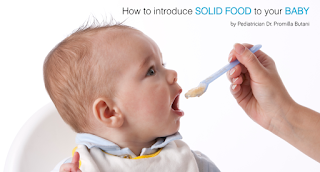How to introduce Solid foods to your baby
Dr. Butani’s Best Pediatrician in Delhi offers pediatric as well as maternal care services. She provides a vast range of pediatric treatments, Counselling of parents and adolescents. Here’s Dr. Butani’s advice on transitioning your baby to solid foods. The first food for infants is breast milk but when your infant grows 1 year old, it is necessary that you start giving solid foods to them. However, milk should remain an important part of our diet throughout the life as it is a source of various essential nutrients. Just like you need to keep some points in mind while breastfeeding (Read our blog ‘Importance and The Ways of Breast Feeding by Pediatrician Dr. Promilla Butani’) you need to pay attention to a few things before you start giving solid foods to you baby.
When is the right time?
When the baby is between the age of 4-6 months parents are advised to start giving solid foods to them. Generally, babies smaller than that age have a tendency to push out the foods with their tongue. Some significant indications that your baby is ready to eat solid foods are:
*The baby can sit either with or without support.
*The baby shows interest in your food.
*S/he tries to bite/mouth toys or other things.
There’s no particular method to assimilate solid foods into your baby’s diet, you just have to try various techniques and different schedules and it may take a while when your baby finally adapts to it. One thing you need to keep in mind is that even after your baby starts eating solid foods they still need breastfeeding until at least 1 year of age. Another important thing is that you should try to develop a routine which means proper eating and sleeping schedule. It will help you organize your own schedule, you’ll be able to take rest and you’ll not feel stressed.
Thumb Rules
Continue feeding your baby breast milk or formula — up to 32 ounces a day. Then:
1. Single-ingredient foods. Most pediatricians suggest that you only introduce single ingredients to your babies without any sugar or salt. And wait for 3-4 days before you feed them another type of food because then you’ll be able to know which foods cause allergy or reactions to your baby, if any.
2. You can only focus on the quality of food, not the quantity. Because you won’t be able to control the quantity of food intake by your baby. You’ll have to be patient. Babies will take time to get used to it.
3. Focus on nutrients. You need to ask your pediatrician which nutrients are vital at what age. For e.g. Zinc & Iron play an important role in children growth especially when they are 6-12 months old therefore we insist giving cereals and lentils that are rich in zinc & iron.
4. Other than cereals and lentils you should add vegetables and fruits to your baby’s diet, one at a time. Vegetables can be boiled and pureed without any sugar and salt. You can mash or give very small bites of fruits.
5. Most of the new mothers believe that a child will grow according to the milk and foods consumed by them, which is not true. A baby’s appetite is controlled by their growth i.e. depending on their hormones. So, do not force them too much to eat.
6. There are some foods such as eggs, peanuts and fish that most commonly become a reason for food allergies. You can avoid such foods. Also, if somebody in family is already have some kind of food allergy e.g. allergic to mushrooms, then you are advised to avoid feeding mushrooms to your child. Also, stick to the rule ‘one food in 3-4 days’ to avoid allergies.
7. Variety is necessary. However we don’t suggest feeding various foods in one day, it is still important to let your baby taste a variety of foods. As many flavours they’ll taste at early age they’ll develop a taste for all these foods and will be less choosy later.
So, now you know that there’s nothing to worry about while transitioning your baby to solid foods from milk. Be experimental but do consult your pediatrician or child specialist doctor.
Source: Dr Promilla Butani Child Care Blog Tips




Comments
Post a Comment